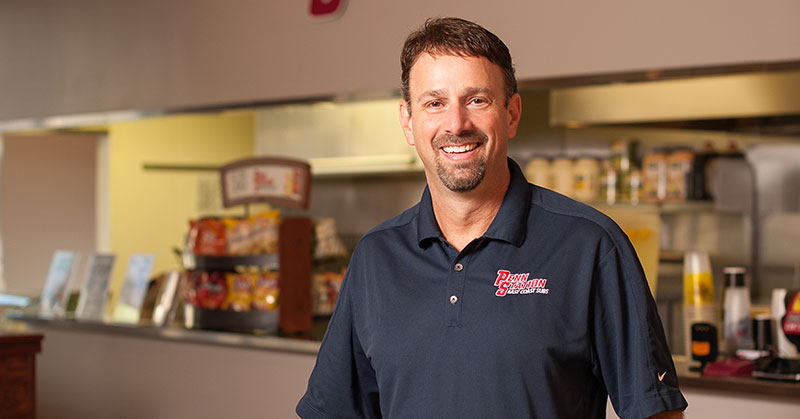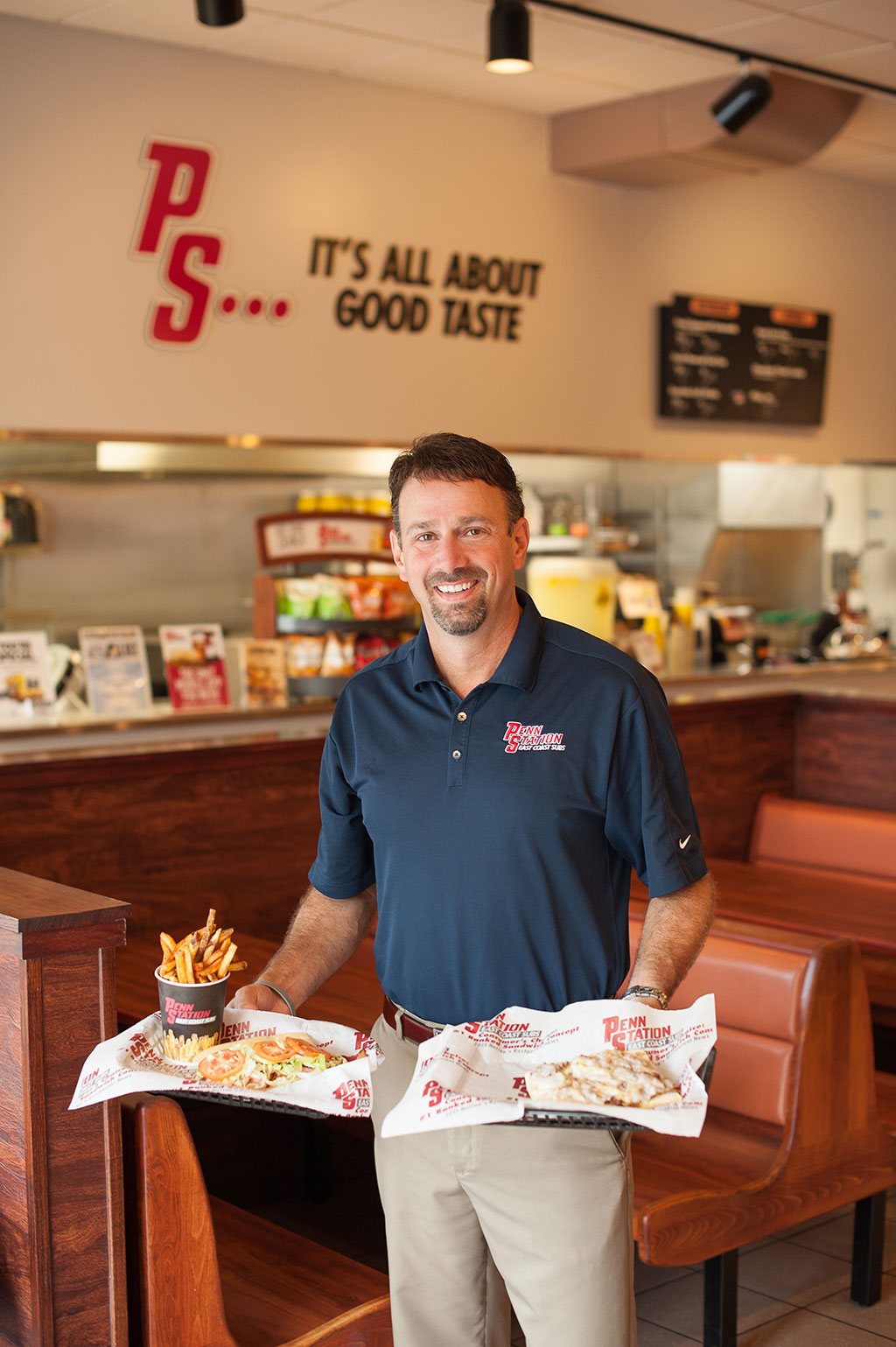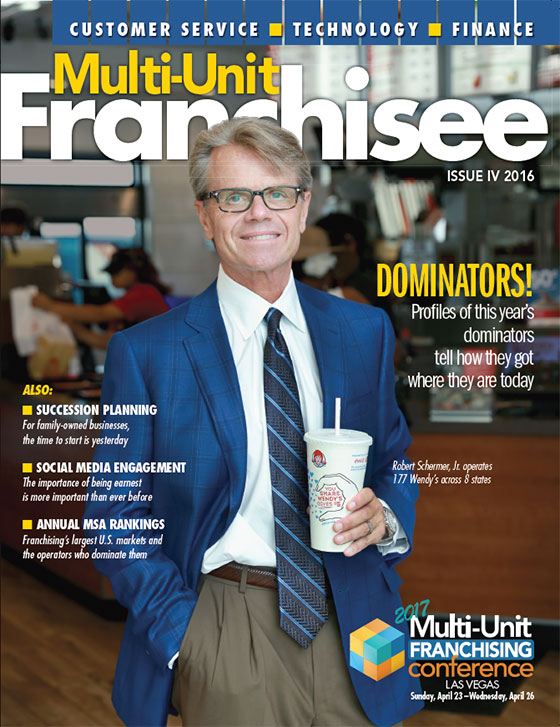Taking It to the Limit: Rob Chinsky Works Hard and Plays Hard

After working his usual 50- 60-hour week tending to his 17 Indianapolis-area Penn Station East Coast Subs stores, Rob Chinsky and his wife Linda moved both their children into their college dorms, hours away, all in one weekend. This typifies Chinsky's priorities in life: family first, with his business and 240 close-knit employees coming in second.
Chinsky, 49, has been in franchising since he was 23, when a family friend financed his first Penn Station restaurant. At the time, franchisees were allowed to own only one store. Next year he'll open his 18th, the maximum the brand allows.
It was a slow and steady growth path to where he is today. "I worked from home for the first 20 years. It was just me, doing all the training and operating with my wife helping with the books," he says. "After store 10, it just got to be too much--much of that due to government regulations. So I hired an office manager and accountant. We bought an old house built in the '40s and re-worked it into office space. It's five minutes from home."
A St. Louis native whose first job as a teen was working in a cousin's deli, at 23 Chinsky moved to Cincinnati in 1990 to open his first restaurant. He had become smitten with the restaurant business and delved into the study of hotel and restaurant management. After two years of working in a restaurant, he was ready to open his own. "I knew little to nothing about franchising, but I put a business plan together and, with no equity, walked into a bank. You can just imagine the looks I got. It was a nice, short meeting," he says.
Family friend Mickey Schulman, whose daughter had married Penn Station founder and CEO Jeff Osterfeld, was opening a Penn Station restaurant in Cincinnati and his manager "flaked." He sold Chinsky the store, backing him financially just as a bank would. It was the seventh store in the new system.
"Mickey, who eventually became my partner, and his wife Phyllis taught me everything I needed to know--what taxes to pay, when they were due, what forms to use. I knew the restaurant side and what people wanted, but I had no clue on the business side. I had to learn it," says Chinsky.
"I was very fortunate. I was given a great opportunity, but I knew I had to make it work, make it a success. I'm a self-starter, and my dream was to hit $100,000 by age 30. I did that, and my next goal was seven figures, and so on. I got my work ethic from my Dad, who never owned his own business. My ambition came from seeing how hard he worked for someone else."
In 1993, Chinsky sold his Cincinnati stores and moved to Indianapolis at Osterfeld's request to take over the corporate store there. He soon became owner of that store and area rep for the region. When he was ready to open a second store, Schulman again co-signed. When Penn Station decided to do multi-unit agreements, Chinsky and Schulman partnered on a 12-unit deal. In 2010, he bought out his partner and mentor.
In 2002, when Penn Station began its Franchisee of the Year awards, the first went to Chinsky. In addition, he's served 10 years as president of the brand's Franchise Advisory Committee, and earlier this year spent time in Washington, D.C., meeting with senators and representatives about franchising and small-business issues. "I've become more interested in politics as I see how it affects our businesses," he says.
He and his restaurants are also active in the community. He served on the board of directors for the Indiana Restaurant & Lodging Association, and he continues to partner on promotions with the Indianapolis Colts.
After he opens his 18th store in 2017, Chinsky plans to focus on improving all the stores and continuing to grow sales. While he still enjoys getting into the kitchen and working alongside his employees every chance he gets, he doesn't have to do that any more unless he wants to.
"I'd like to travel more with my family, and that may be possible because I have two great operations directors, both of whom have been with me for about 20 years," he says. "I also have multiple GMs who have been with me for 10 to 15 years, so we have a great team. We work hard and play hard."
His most beloved and stalwart partner is his wife Linda. "She's a great partner," he says."I was in business before I met her and she actually moved with me, gave up her company-car job, and moved in with me without a ring. I feel blessed to have her."
Chinsky remains committed to Penn Station. "From day one, when I got involved, I was sold on the overall simplicity of the menu. It's all about freshness--everything is made daily fresh on the grill. I'm a true believer in the food. That's why I tell people I'm training and developing to make it the way it's supposed to be made--follow the ops manual," he says. "It comes down to customer service. If customers have a memorable experience, the food will be memorable."
 Name: Rob Chinsky
Name: Rob Chinsky
Title: President
Company: Chinsky Restaurant Group
No. of units: 17 Penn Station East Coast Subs
Age: 49
Family: Married with two grown children
Years in franchising: 26
Years in current position: 26
Personal
First job:
I worked in a Jewish deli a cousin owned.
Formative influences/events:
My mentor is my old business partner, Mickey Schulman. Without him I wouldn't have been able to do this because he backed me and believed in me to get started.
Key accomplishments:
From a personal standpoint, marrying the right person and having two kids. From a business perspective, owning my own business.
Biggest current challenge:
Staffing.
Next big goal:
To travel more and open our next store.
First turning point in your career:
My Mom suggested we look at Penn Station when they started franchising.
Best business decision:
After 10 years in the business, I started building a support system in 2000 by hiring my first operations director and a part-time accountant.
Hardest lesson learned:
Life is short and you have to enjoy it.
Work week:
Changes weekly, but averages 50 to 60 hours per week--and I still love it. You love it or you hate it with restaurants. It's not for everyone.
Exercise/workout:
I play hockey twice a week and go to the gym twice a week.
Best advice you ever got:
If you help enough people get what they want, you will get what you want.
What's your passion in business?
I like watching other people grow. I have such longevity with many of my managers that I've been able to watch them and their families grow up. My passion is helping them build their careers.
How do you balance life and work?
I don't think I had the balance at the beginning, especially with my first 10 stores. As I built my support system, one of our big management beliefs became to take care of each other and put families first. We learned to find that balance together.
Guilty pleasure:
Food.
Favorite book:
Anything by Zig Ziglar.
Favorite movie:
"The Shawshank Redemption."
What do most people not know about you?
Not much. I'm a pretty open book.
Pet peeve:
People without a good work ethic.
What did you want to be when you grew up?
A police officer.
Last vacation:
I spent time in Central Oregon last summer with my family.
Person I'd most like to have lunch with:
My wife.
Management
Business philosophy:
Work hard, play hard. When you're working, that is what you're doing. When it's time not to work and have a personal life, it's time to play hard as well. Life is short.
Management method or style:
I'm a "do it now" manager, so if I hear something from the grapevine or there is something I need to talk to about, I deal with it right away. I don't beat around the bush.
Greatest challenge:
Staffing and helping general managers find crew and their management teams.
How do others describe you?
As having high expectations, but fair.
One thing I'm looking to do better:
See the glass half full and not half empty. As an owner, I tend to go in and see what's wrong first and not what's right.
How do you give your team room to innovate and experiment?
They have to be able to make their own mistakes because sometimes you learn by making mistakes. I want them to learn on my dime. It's okay to make mistakes as long as we learn from them.
How close are you to operations?
Very close. I can still throw the apron on and get in and run the line, and my employees know that I can go in and help. I wish I could do it more, but when I do we have a good time. I came from the operations side and doing dishes in a restaurant and working my way up, so operations is probably my forte.
What are the two most important things you rely on from your franchisor?
Good data (how we're doing compared with the rest of the stores because I don't want to be average) and a good support system. I can talk to the president with a phone call. If you have a question, you can get an answer the same day.
What I need from vendors:
Great service and great quality.
Have you changed your marketing strategy in response to the economy? How?
We're placing more focus on Millennials.
How is social media affecting your business?
We're focusing on social media more in the last year than we ever have. Penn Station launched an app this year and we're doing a lot more advertising on social media.
How do you hire and fire?
I hire my general managers and they hire everyone else. For hiring a general manager, we do a very thorough process. When we have to fire, I make sure we have the proper documentation. Before firing, we try to salvage the employees.
How do you train and retain?
Penn Station has a thorough training program. We do an orientation every week and I personally go to the orientation so every employee meets me. Since all 17 of our stores are centrally located, we do one orientation. It shows a commitment from the employees to take the time to go to a different location early in the morning. To retain, we give proper raises and take care of our people.
How do you deal with problem employees?
Sometimes you know quickly whether they'll make it or not. For someone we think we can work with, we sit down and try to work through problems. Every employee is different. I tell people if they don't enjoy going to work more times than not, they should find something else. Ultimately, I want them to be happy.
Fastest way into my doghouse:
Being lazy and not being honest.
Bottom Line
Annual revenue:
Approximately $12 million.
2016 goals:
Hiring the right people and growing sales.
Growth meter: How do you measure your growth?
Customer counts.
Vision meter: Where do you want to be in 5 years? 10 years?
I want to travel more and work a little less, but I don't plan on retiring anytime soon.
How is the economy in your region affecting you, your employees, your customers?
It hasn't affected us as much from a customer standpoint, but wages are rising and we are trying to accommodate that, so it affects our labor costs. Our whole industry is facing a major challenge finding employees.
Are you experiencing economic growth in your market?
Yes.
How do changes in the economy affect the way you do business?
We just continue to do what we do the best we can.
How do you forecast for your business?
I do an annual forecast and update it every month.
What are the best sources for capital expansion?
My goal is to self-fund. At this point, I have a line of credit if I need it.
Experience with private equity, local banks, national banks, other institutions?
I have a line of credit and maintain a good relationship with my banker.
What are you doing to take care of your employees?
We create an ownership mentality with our general managers by giving them a percentage of the profits, paid monthly. We try to do things outside the store level, too. I often give advice on a personal as well a business level.
How are you handling rising employee costs (payroll, minimum wage, healthcare, etc.)?
I've learned to stop fighting it. You can only make up so much of it by raising food costs, so there is a point where it affects the bottom line. We still streamline and do the best we can.
How do you reward/recognize top-performing employees?
Penn Station has a performance evaluation system where an area representative comes into the store and does an evaluation. We take that very seriously. Our general managers get recognized by how well they do in that evaluation compared with their peers. The top-performing general managers from that performance evaluation can earn a bonus of up to $10,000 or $12,000.
What kind of exit strategy do you have in place?
At 49, I'm getting closer to that, but currently I do not have an exit strategy. It's in process.
Share this Feature
Recommended Reading:
FRANCHISE TOPICS
- Multi-Unit Franchising
- Get Started in Franchising
- Franchise Growth
- Franchise Operations
- Open New Units
- Franchise Leadership
- Franchise Marketing
- Technology
- Franchise Law
- Franchise Awards
- Franchise Rankings
- Franchise Trends
- Franchise Development
- Featured Franchise Stories
FEATURED IN

Multi-Unit Franchisee Magazine: Issue 4, 2016

$200,000
$61,440





 The multi-unit franchise opportunities listed above are not related to or endorsed by Multi-Unit Franchisee or Franchise Update Media Group. We are not engaged in, supporting, or endorsing any specific franchise, business opportunity, company or individual. No statement in this site is to be construed as a recommendation. We encourage prospective franchise buyers to perform extensive due diligence when considering a franchise opportunity.
The multi-unit franchise opportunities listed above are not related to or endorsed by Multi-Unit Franchisee or Franchise Update Media Group. We are not engaged in, supporting, or endorsing any specific franchise, business opportunity, company or individual. No statement in this site is to be construed as a recommendation. We encourage prospective franchise buyers to perform extensive due diligence when considering a franchise opportunity.